Yesterday, I walked down all those stairs to the dock with a dying patient and his family. I carried the patient’s bag of overnight things; the family carried the patient on a rigid orange plastic board.. They didn’t really need me to accompany them, but I needed to make sure we got our orange camilla back.
Federico had advanced cirrhosis; he had been making the four hour boat trip to Santa Clotilde every few months so that we could do a paracentesis and remove some of the fluid that accumulated in his abdomen and made it difficult for him to breathe. But in the past month he had come twice, and his blood pressure dropped dangerously low during the fluid removal process: 60/40.
(parenthetical remark about blood pressure. Everyone’s blood pressure here is low by US standards. Most people I see in clinic have a blood pressure of 90/60 or 100/60).
I spoke to Federico’s wife about his prognosis. We were not going to be able to cure him, and it seemed like his liver disease was getting worse. We could keep him here at Santa Clotilde, or he could go back to his village to die.
It was election time. Voting happens on Sundays, and voting is mandatory. People must vote in their home district or face a fine (and possible loss of privileges like health insurance), so everyone goes home to vote. All day long, family members stopped by Federico’s hospital room to say goodbye, and in the morning his wife told me that the decision had been made; they would take him home to his village to die.
But the day after the election, everyone is going home to their villages, and there were literally hundreds of people crowded down at the dock. Federico was alive, but he was skeletally thin with a huge belly, and there was blood on his bedsheet from where the IV was removed. As we brought him down to the dock, strangers crowded around to get a look. “Is he dead?” they wondered aloud, as they crowded onto the floating dock. “Everyone, get back!” shouted the motorist. The floating dock had begun to sink with all the onlookers, and Federico got soaked. “Estás vivo?” The motorist looked closely at Federico, slapping his cheek gently. He did not want to take a dead man on his boat. They loaded him on the canoe. “This bed?” the motorist looked at me. “We need it back”. So they unrolled Federico from the rigid plastic board, and Declan and I carried it up all the stairs to the Centro de Salud. The crowd of people parted to let us pass.
The idea of privacy is different here. Maybe it comes from families all living together in one big room. Any time there is any kind of medical crisis, there are so many people peering in, trying to watch. A man with HIV and hep B cirrhosis arrived, after vomiting lots of blood. By the time they brought him up from the boat, he was already dead. Everyone crowded around the doors and the windows of the tópico, trying to get a look. We had to close the windows, despite the heat, and ask the night watchman to chase people away.
We worked that Sunday, Election Day; people had come from their faraway villages to vote; many stopped by the Centro de Salud while they were in town, wanting to take care of their fevers and diarrhea and worms. The place was packed on that Monday; I was post-call and the two técnicas who were supposed to work that day had not shown up. Lili arrived and chased most of the patients away. “Today is a holiday, all of you know that. It’s circled in red on the calendar. On holidays we only take care of emergencies. What is an emergency? A seizure, vaginal bleeding in pregnancy, an accident, a very high fever. If you don’t have an emergency, please come back tomorrow!”
And of course they did come back the next day. So much giardia, so many worms. Ascaris (giant roundworm) mostly, with some Uncinaria (hookworm) mixed in. I have had stool samples with 3 or 4 different parasites visualized on microscopy. Entamoeba histolytica, Hymenolepsis nana (dwarf tapeworm)…our lab is busy! But very distressing for the patients. Yesterday, I was talking to a patient with an incarcerated umbilical hernia that we were getting ready to transfer to Iquitos. She started to retch; I got her a kidney basin to hold her vomit, but when I looked down, there was a live, wiggling worm! Six inches long! Some of the kids who come in with diarrhea also report vomiting worms. I got a text from Heiner, the SERUMista doctor in Tacsha Curaray. “A three year old child just arrived, with rectal prolapse; it’s very painful; what should I do?” I showed the photo to Lili and Neo, two of the experienced técnicas. “Tell him to get some Vaseline and just push it it; tell him not to be afraid, that it will go back in!” A short while later, Heiner texted me the photo of his success. Rectal prolapse in young children is caused by a large burden of worms, they tell me.
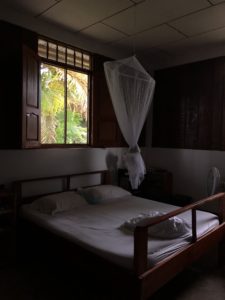
our bedroom
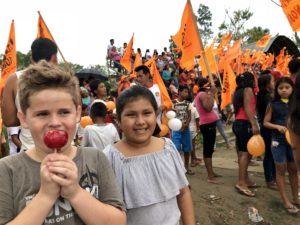
Declan and his friend Dayana just before the elections, at Hugo’s Closing of the Campaign.
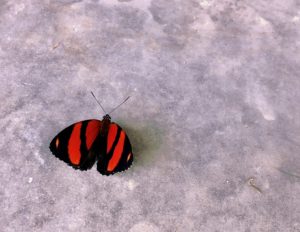
butterfly outside the consultorio
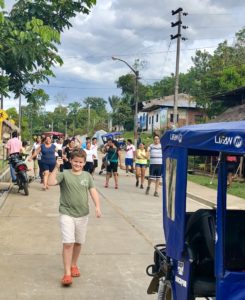
Declan leading the charge on the Fun Run for the Centro de Salud
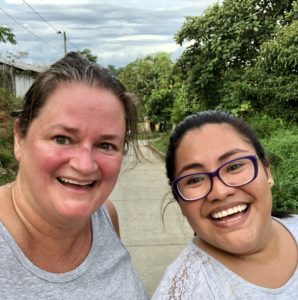
with Ibis, our SERUMista psychologist, on the Fun Run
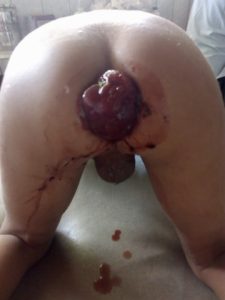
rectal prolapse in a 3 year old child
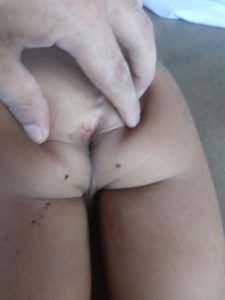
all better!
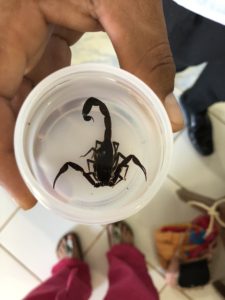
Jens found a scorpion in our meeting room!
That poor baby! How are you and Declan protecting yourselves from getting worms? The thought of them gives me the willies. We had a lot of giardia in the rural areas of Hawaii from people drinking mountain water but I never saw a big tapeworm!
Hugs to you both, Lynne
Declan and I have both been healthy the whole time we have been here; I might take some albendazole on the plane, though!
Comments are closed.